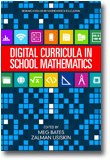
Digital Curricula in School Mathematics
Edited by:
Meg Bates, The University of Chicago
Zalman Usiskin, The University of Chicago
A volume in the series: Research in Mathematics Education. Editor(s): Denisse R Thompson, University of South Florida. Mary Ann Huntley, Cornell University. Christine Suurtamm, University of Ottawa.
Published 2016
The mathematics curriculum – what mathematics is taught, to whom it is taught, and when it is taught – is the bedrock to understanding what mathematics students can, could, and should learn. Today’s digital technology influences the mathematics curriculum in two quite different ways. One influence is on the delivery of mathematics through hardware such as desktops, laptops, and tablets. Another influence is on the doing of mathematics using software available on this hardware, but also available on the internet, calculators, or smart phones.
These developments, rapidly increasing in their availability and decreasing in their cost, raise fundamental questions regarding a mathematics curriculum that has traditionally been focused on paper-and-pencil work and taught in many places as a set of rules to be practiced and learned.
This volume presents the talks given at a conference held in 2014 at the University of Chicago, sponsored by the Center for the Study of Mathematics Curriculum. The speakers – experts from around the world and inside the USA – were asked to discuss one or more of the following topics:
• changes in the nature and creation of curricular materials available to students
• transformations in how students learn and how they demonstrate their learning
• rethinking the role of the teacher and how students and teachers interact within a classroom and across distances from each other
The result is a set of articles that are interesting and captivating, and challenge us to examine how the learning of mathematics can and should be affected by today’s technology.
CONTENTS
Preface. Welcoming Remarks. PART I—CREATING DIGITAL CURRICULUM. Designing Curriculum for Digital Middle Grades Mathematics: Personalized Learning Ecologies, Jere Confrey. Developing and Implementing “Smart” Mathematics Textbooks in Korea: Issues and Challenges, Hee-chan Lew. Technology-Enhanced Teaching/Learning at a New Level with Dynamic Mathematics as Implemented in the New Cabri, Jean-Marie Laborde. The Re-Sourcing Movement in Mathematics Teaching: Some European Initiatives, Kenneth Ruthven. Inquiry Curriculum and E-Textbooks: Technology Changes that Challenge the Representation of Mathematics Pedagogy, Michal Yerushalmy. PART II—IMPLEMENTING DIGITAL CURRICULUM. Connections and Distinctions among Today’s Digital Innovations and Yesterday’s Innovative Curricula, Valerie L. Mills. Technology to Support Mathematics Instruction: Examples from the Real World, Loretta J. Asay. We Thought We Knew It All, Josephus Johnson. Deeply Digital Curriculum for Deeply Digital Students, Brian Lemmen. PART III—RESEARCHING DIGITAL CURRICULUM. Analysis of Eight Digital Curriculum Programs, Jeffrey Choppin. A Design Experiment of a Deeply Digital Instructional Unit and its Impact in High School Classrooms, Alden J. Edson. Keeping an Eye on the Teacher in the Digital Curriculum Race, Janine Remillard. New Starting Points for Number Sense Using TouchCounts, Nathalie Sinclair. PART IV—BROADER CONSIDERATIONS ABOUT DIGITAL CURRICULUM. Digitally Enhanced Learning, Philip Daro. Mathematics Standards and Curricula under the Influence of Digital Affordances – Different Notions, Meanings and Roles in Different Parts of the World, Mogens Niss. Mathematics Curriculum, Assessment and Teaching for Living in the Digital World: Computational Tools in High Stakes Assessment, Kaye Stacey. Mathematics Education is at a Major Turning Point, David Moursund. Deeply Digital STEM Learning, Chad Dorsey. Closing Remarks, Zalman Usiskin.
-
Paperback9781681234113
Web price: $45.04 (Reg. 52.99)
-
Hardcover9781681234120
Web price: $80.74 (Reg. 94.99)
- eBook9781681234137

-
 A Five-Year Study of the First Edition of the Core-Plus Mathematics Curriculum
A Five-Year Study of the First Edition of the Core-Plus Mathematics Curriculum
-
 Approaches to Studying the Enacted Mathematics Curriculum
Approaches to Studying the Enacted Mathematics Curriculum
-
 International Perspectives on Mathematics Curriculum
International Perspectives on Mathematics Curriculum
-
 International Perspectives on Mathematics Teacher Education
International Perspectives on Mathematics Teacher Education
-
 Language and Mathematics Education
Multiple Perspectives and Directions for Research
Language and Mathematics Education
Multiple Perspectives and Directions for Research
-
 Researching Pedagogy and Practice with Canadian Mathematics Teachers
Researching Pedagogy and Practice with Canadian Mathematics Teachers
-
 Variability is the Rule
A Companion Analysis of K-8 State Mathematics Standards
Variability is the Rule
A Companion Analysis of K-8 State Mathematics Standards

